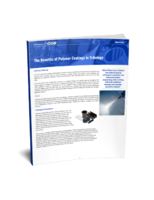MHEDA Journal addresses fuel cell forklift debate.
Share:
Press Release Summary:
Second Quarter 2010 issue of The MHEDA Journal includes point/counterpoint between Dan Dwyer, VP and General Manager of industrial truck battery supplier Sackett Systems, and Warren Brower, Product Marketing Manager at Plug Power Inc., a manufacturer of hydrogen fuel cells. According to Dwyer, fuel cells have not yet proven their return on investment to material handling end-users. Brower, on the other hand, touts benefits of hydrogen fuel cells and how they can improve end-user operations.
Original Press Release:
Fuel Cell Forklift Debate
Makers of industrial truck batteries and hydrogen fuel cells discuss each power source.
Dewitt, NY - The Second Quarter 2010 issue of The MHEDA Journal (http://www.themhedajournal.org), the leading online magazine for the forklift, conveyor, storage & handling, and general material handling equipment industries, includes a point/counterpoint between Dan Dwyer, vice president and general manager of industrial truck battery supplier Sackett Systems, and Warren Brower, product marketing manager at Plug Power Inc., a manufacturer of hydrogen fuel cells.
According to Dwyer, fuel cells have not yet proven their return on investment to material handling end-users. "In their limited tests, fuel cell-powered machines have shown that they can perform relatively adequately. They may indeed be a solution for end-users down the road," he says. "Until then, there are still a few concerns that distributors should consider in a detailed way before encouraging customers to move forward with adoption." Among the concerns he lists are productivity, the business model, service requirements and the unknowns that exist with an unproven product.
On the other hand, Brower touts the benefits of hydrogen fuel cells and how they can improve end-user operations. "The key with fuel cells is to focus on specific high-volume and high-throughput operations," he says. "As long as the fuel cell has fuel in it, it will run at full speed, whereas a lead-acid battery has performance limitations as it discharges. In some applications, a fuel cell can last one and a half to two times longer than a fully charged battery. In a high-throughput environment, the productivity difference can be substantial."
For the complete articles, read "Beware Fuel Cell Lift Trucks" and "Fuel Cells Provide End-User Benefits" in the April 2010 issue of The MHEDA Journal Online at www.themhedajournal.org. The print version was mailed to subscribers on April 15. The MHEDA Journal is published quarterly in January, April, July and October. For more information, contact Chris Powers, editor, (315) 445-2347, e-mail: chris@datakey.org.
About MHEDA
Founded in 1954, the Material Handling Equipment Distributors Association (MHEDA) is the premier source for manufacturing knowledge, education and networking. Through its member journals (www.TheMhedaJournal.org), e-magazines, newsletters and industry wiki (www.wikimheda.org), MHEDA connects the manufacturers of storage and handling, lift trucks and conveyor equipment and distribution leaders for the purpose of delivering optimal solutions to the users of those products. MHEDA publications are the industry's voice for all matters related to the latest technology and the most up-to-date processes spanning the movement and storage of all materials. A 501(c)3 organization, MHEDA members span all of North America.




